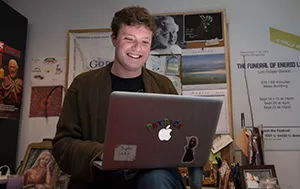Going Deep

Close collaboration with faculty is just one of the ways that the Honors Program helps Swarthmore students such as Anisa Knox '15 unlock their potential. Above, Knox and Susan W. Lippincott Professor of Modern & Classical Languages Alan Berkowitz.
Swarthmore presents a rich and stimulating academic experience for all, challenging students to step outside of their comfort zones to forge interdisciplinary connections. The College's Honors Program takes that intellectual inquiry one step—or is it a leap?—further.
In true Swattie fashion, honors students defy categorization. But when you speak to them about why they pursued honors, a narrative emerges. The Craigslist ad might read: Self-driven, academically adventurous student seeks immersive experience with classmates, faculty, and thought leaders. Love of conversation a must.
For Patrick Ross ’15, the defining moment was his first honors seminar on Shakespeare.
“I was so steeped in it that I started talking in meter,” says the Honors theater and English literature major. “Taking another English course [after] almost seemed tame.”
For Abigail Frank ’15, it’s the conversations with classmates that keep going even after a five-hour seminar.
“By far, my favorite thing is that I get to hang out with cool people and talk about interesting things,” says the honors English literature major and history minor from Kennett Square, Pa. “It’s invigorating to study with people who are so engaged and excited.”
The Oxford tutorial system on which the Honors Program has been modeled for nearly 100 years also appealed to Alexandra Willingham ’15, whose family is from the U.K. She relishes the small groups’ brainpower and preparation.

“It’s invigorating to study with people who are so engaged and excited,” says Honors English literature major Abigail Frank '15.
“You can’t get away with a shallow comment or answer,” says the Honors history major and political science minor from Piedmont, Calif. “You’re pushed to think at a much deeper level.”
The program also pushes students to chart their own course, especially in their last two years, once they’ve zeroed in on their interests.
“I get experience in the fields and techniques that I’m most interested in,” adds Rebecca Senft ’15, an Honors neuroscience major from St. Johnsville, N.Y., “which means no two honors majors will really mean the same thing.”
Devising their own research agenda and carrying it out, honors students embody DIY.
“The freedom and responsibility of that is both exhilarating and terrifying,” says Maddy Booth ’15, an honors linguistics and biology major from Brentwood, Tenn. “But the chance to have this independence and be held accountable for our research is one of the draws.”
You can’t just lean on the syllabus, adds Anisa Knox ’15, an honors Chinese language and literature major and educational studies minor from Princeton, N.J.
“Students have to take the initiative to provide intellectually stimulating questions and research materials.”
By no means, however, are honors students unguided. Most cite close collaboration with faculty as a key to the experience. Among them: Peter Weck ’15, an honors physics major and mathematics and philosophy minor from Columbia, Ill., whose studies helped him to publish a scientific paper with a department chair; and Julia Murphy ’15, an honors chemistry major and mathematics minor from Denver, Col., whose path triggered an “overwhelmingly positive and elucidating” research opportunity with a professor.
“There’s a real gift in the one-on-one tutoring,” says Ross, whose department chair meets with him two hours a week and has even sent text messages relating to his thesis script.

“There’s a real gift in the one-on-one tutoring,” says Patrick Ross '15, whose department chair meets with him two hours a week and has even sent text messages relating to his thesis.
Ultimately, though, it’s outside experts (several of whom are alumni who went through the program themselves) who test the honors students’ mettle through oral and written examinations. Those who make the grade leave Swarthmore with newfound confidence and contacts.
“I get to discuss my favorite topics, my research, with a visiting expert who is passionate about the same issues I’m passionate about, and who can offer fresh critical perspectives,” says Booth. “That’s the ideal capstone to my Swarthmore studies.”
Another unique aspect is how the exams draw upon not just a semester’s worth of lessons but several years’ worth, crisscrossing disciplines, notes Randall Burson ’15, an honors biology major and Latin American studies and sociology & anthropology minor from Los Lunas, N.M.
“Honors is about being able to say I have owned the material,” he says, “rather than sticking all of my notes in a box to gather dust.”
Adds Nathan Cheek ’15, an honors psychology and Spanish major from Wellesley, Mass.: “You have this time at the end of college to pause and reflect on what you’ve learned, hopefully finding meaningful and until-then-unnoticed connections between pieces of knowledge.”
Honors students leave with original thinking and critical examination skills, positioning themselves for elite graduate school programs and academia. But the skills also prepare them for a variety of careers in engineering (as pursued by honors engineering major Hayden Dahmm '15), software development, medicine, journalism, social work, law, and more. “Places where recognizing the right questions to ask is most of the job,” are natural fits, says Booth.
For all of the talk about what sets honors apart, though, participants say it primarily distills the fundamental principles of Swarthmore academics. It’s not about who’s the smartest or who studies hardest, necessarily. Honors is what you make it.
“Underclassmen should consider honors not as an honor but as a unique opportunity that we Swarthmore students are privileged to have,” says Booth.



